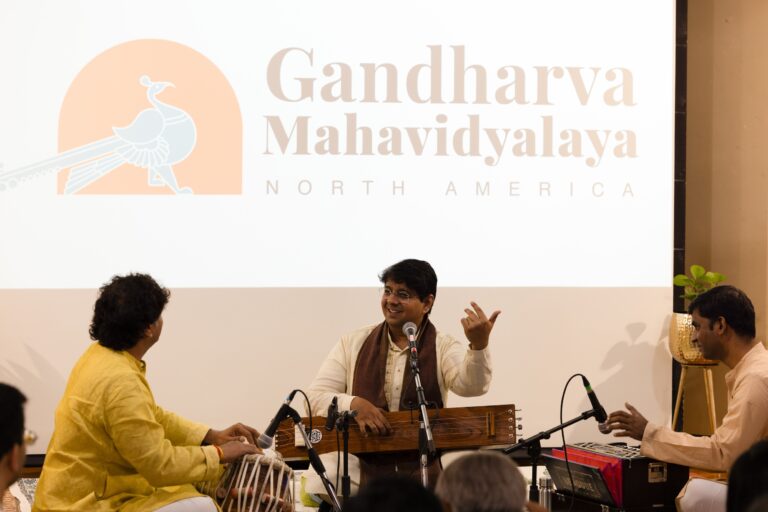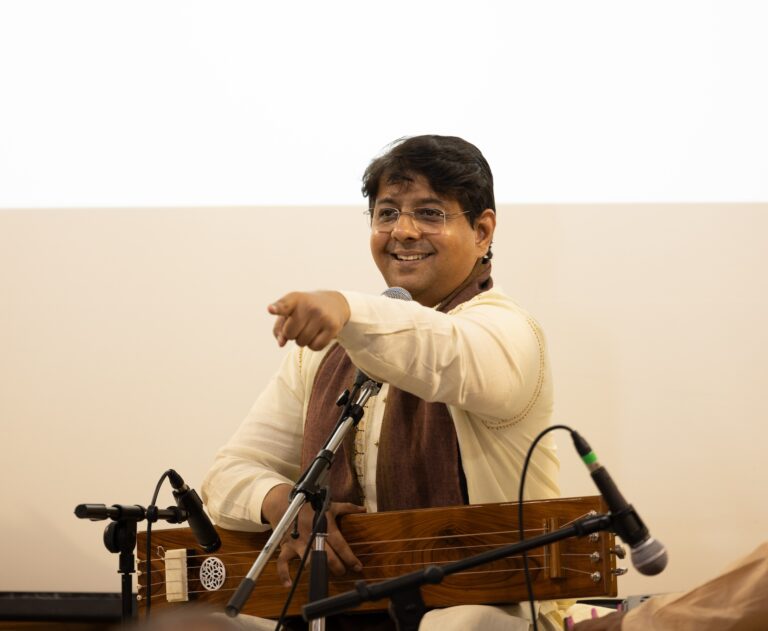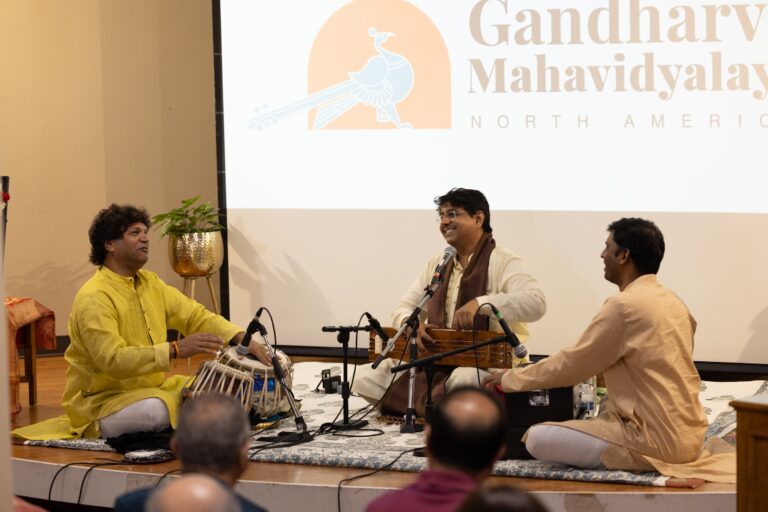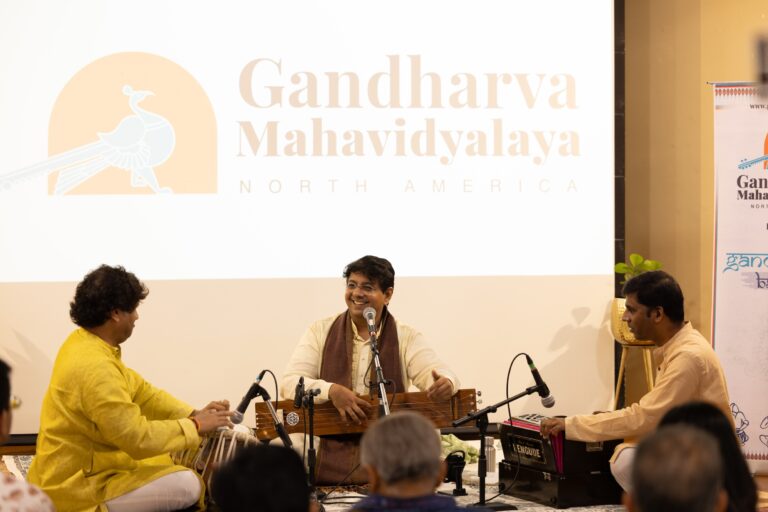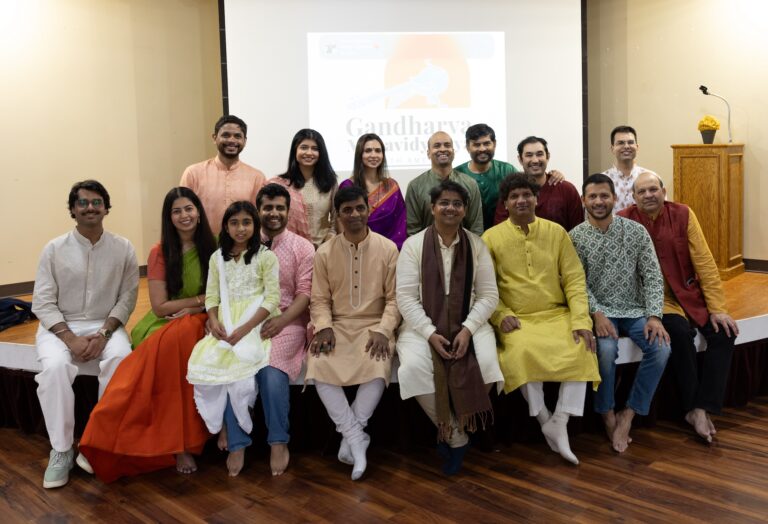Darbar Sangeet: A concert by Omkar Dadarkar
It was a privilege to host Gwalior exponent Omkar Dadarkar in our second Baithak concert of the year at Gandharva Mahavidyalaya North America this past Saturday. He was accompanied by Sanjay Deshpande on Tabla and Siddhesh Bicholkar on Harmonium.
Dadarkar started with Raga Ramkali—a deeply spiritual and calming melody belonging to the Bhairav parent scale consisting of Komal Rishab and Komal Dhaivat. His deep, resonating voice perfectly brought out the intensity of the raga. He extensively explored the lower and middle octaves in his alaap with slow, heavy, intentional movements, creatively displaying Bhairav-ang “G M Ṟ S”. He presented the traditional bada khyal “Aaj raadhe to” set to vilambit ektaal. While he did touch upon the characteristic phrase of Ramkali “M̄ P Ḏ Ṉ Ḏ P” a couple of times in the lower octave, which is essential to introducing the raga, he skillfully restrained himself from fully exploring the phrase for the next 20 or so minutes. The phrase that uses Tivra Madhyam and Komal Nishad gives the raga an “obscure yet spirited” personality. My favorite part of his presentation was the mind-boggling creativity with which he incorporated the phrase into his approach to the Sam, leaving me at the edge of my seat several times as the audience spontaneously broke into a “Wah” with every landing. Dadarkar’s true brilliance is revealed, however, when he breaks into the laykari and taans. His training and sadhana of the Gwalior gayaki shine brightly through every phrase. While being thoughtful and disciplined in his presentation, he is most importantly adventurous, a quality that I would love to see more of in other musicians of this generation. In the drut section, he performed the traditional composition “Hu to baar baar” set to teental and concluded brilliantly with “Jaag re salone” set to drut ektaal.
He presented raga Desi next, which definitely was the highlight of the morning. Completely contrasting the mood of Ramkali, Desi brought out the pathos, creating a somber, “Viraha-rasa” aspect in his singing. A raga that shows aspects of Kaafi and Asavari and has a Vakra (non-linear) chalan, thereby requiring considerable taleem from a proper Guru to master it. He presented a soul-stirring bada khyal “Balam bina kaise” in vilambit teentaal, which was so profound that it will remain a part of my psyche forever. He concluded with the melodious “goonde goonde laao maalaniya”. Upon the audience’s request, he also performed Hindol—the lofty pentatonic raga sung during spring, presenting the composition “koyaliya bole bana mein” and finally concluded with a “Vaikunthichya Raya”, a Marathi natyageet in raga Bhairavi.
Sanjay Deshpande on Tabla and Siddhesh Bicholkar on the harmonium were absolutely fantastic. They displayed a perfect understanding of Dadarkar’s style, their ability to add on to his laykari, picking up from the phrases he left off at, and taking them to the next level with their creativity. I noticed them constantly encouraging each other to experiment and push their boundaries. I have to mention Deshpande’s exemplary tabla tuning abilities. A perfect balance of the dayan and bayan, the chaat and its aaas perfectly matched up. His chemistry with Dadarkar reminded me deeply of many outstanding concerts of his Guru Pt. Suresh Talwalkar and Pt. Ulhas Kashalkar, which definitely brought on some nostalgia.
– By Divya Khandekar
Artist Bio
Omkar Dadarkar
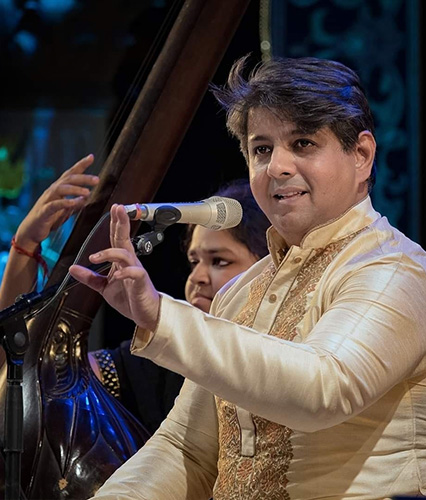
When globalization is firmly gripping the world making most of the modern society involved in material gold-rush, very few persons maintain their originality and tradition. Omkar Dadarkar is one of them. Born in Mumbai on 30th July 1977, he was enthused by his parents, both being Marathi Natya-Sangeet performers, and took his initial training under Dr. Ram Deshpande He also received scholarship from C.C.R.T. (New Delhi).
As the nephew and shishya of the legendary vocalist Padmashri Manik Verma, Omkar was fortunate enough to get taleem from her. After that he took training from Pt. Yashwantbua Joshi of Gwalior Gharana under the Guru-shishya parampara scheme of Dadar-Matunga Cultural Centre.
Being selected as scholar in I.T.C. Sangeet Research Academy in 1999, he had undergone a rigorous training under the tutelage of guru Pt. Ulhas Kashalkar. He successfully completed his six years training in the Academy with A+ grade.
He got his training of light classical form under Vidushi Girijadevi and Srinivas Khale. He also completed Sangeet Alankar from Gandharv Mahavidyalaya and graduated in Marathi lit. and History.
Sanjay Deshpande
Sanjay Deshpande is a talented Tabla Player based in Pune, INDIA. He was born in a music loving family and was introduced to the art of playing Tabla under Late Pt. Sabade at Pune Bharat Gayan Samaj. Later he took Taleem (lessons) from the renowned Tabla player Pt. Suresh Talwalkar of Delhi-Farookabad Gharana, in a Guru Shishya Parampara .He also had the privilege of understanding the beauty of Punjab Gharana under the guidance of world renowned Tabla maestro Ustad. Alla Rakha Khan Saheb and Pt.Yogesh Samsi. At present he is taking Taleem from Pt. Vivek Joshi.
Sanjay is recipient of the coveted “Ahmedjaan Thirakwaa Scholarship” for Solo Performance. He has accompanied renowned artists like Smt. Vasundhara Komkali, Pt. Ulhas Kashalkar, Pt. Smt. Malini Rajurkar, Pt. Jasraj, Dr. Prabha Atre, Pt. Dinkar Kaikini, Dr. Ashwini Bhide-Deshpande , Smt. Veena Sahastrabudhe and many such great artists.
He has performed in major conferences such as Sawai Gandharwa Music Festival Pune, Paluskar Smarak Conference, Shankarlal Samaroha in New Delhi, I.T.C. Sangeet Sammelan . Dowerlane Conference, Kolkata.
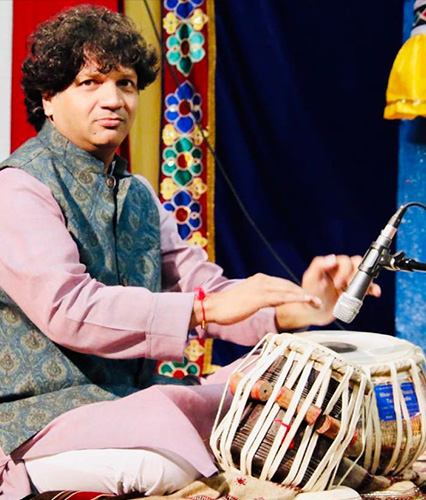
Siddhesh Bicholkar
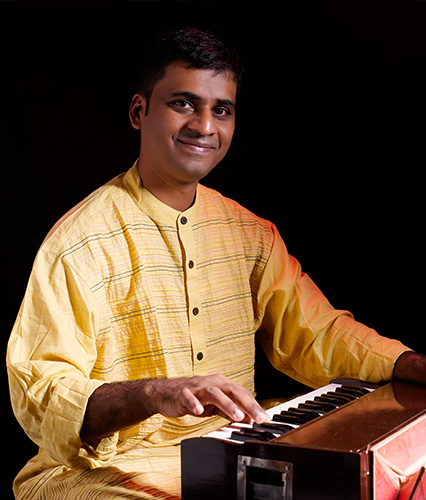
Having imbibed primary lessons in music since childhood, Siddhesh has been privileged to receive guidance from his first Guru, Shri Sharad Mathkar in Goa and later, placed under the tutelage of Pt. Tulsidas Borkar, renowned Harmonium exponent and Guru.
The difficult and lesser known art of Jaltarang was taken up by Siddhesh with inspiration from Shri Sharad Mathkar, who personally crafted his first set of Jaltarang apparatus.
Siddhesh gained valuable knowledge about instrumental recitals and depths of classical music from Pt. Tulsidas Borkar, enabling Siddhesh to present Jaltarang recitals, a very rare occurrence in Indian classical music.
He has been the recipient of many eminent music scholarships including accolades by the Govt. of India and its H.R.D. Ministry and many other awards to add to his long list of achievements. He is presently employed as a classical music teacher at Sharda Sangeet Vidyalaya, Mumbai.

